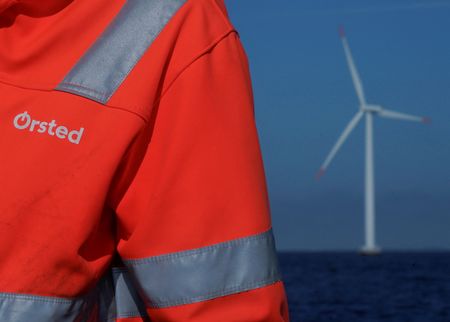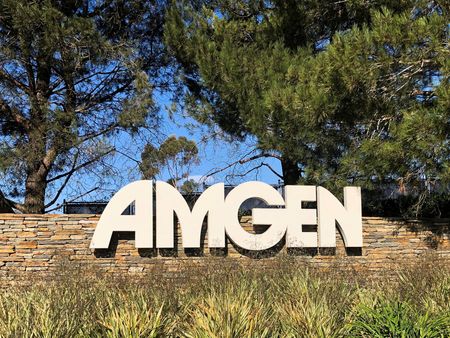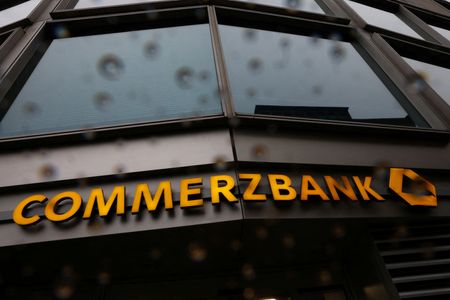By Stine Jacobsen, Jacob Gronholt-Pedersen and Soren Jeppesen
COPENHAGEN (Reuters) -Shares in Orsted slid 17% on Monday after the U.S. halted the Danish company’s Revolution Wind project off Rhode Island, adding to concerns about the future of the U.S. offshore wind market as President Donald Trump curbs investment in renewable energy.
Orsted, the world’s biggest offshore wind farm developer, had already been struggling with project delays and cancellations in the United States and elsewhere due to rising costs, higher interest rates, and supply chain problems. It has lost 87% of its market value since its peak in January 2021.
The U.S. Bureau of Ocean Energy Management (BOEM) issued a work-stop order late on Friday on Orsted’s $1.5 billion project, which is 80% complete with 45 out of 65 turbines installed. The wind farm was expected to supply electricity to 350,000 homes in Rhode Island and Connecticut starting next year.
It was the second major suspension this year by BOEM, which halted Norwegian energy company Equinor’s Empire Wind 1 project off the coast of New York in April. President Trump has repeatedly criticised wind energy as ugly, unreliable and expensive and has suspended new offshore wind leasing pending environmental and economic review of projects.
Despite the setback, Orsted, which is 50.1% owned by the Danish state, reiterated on Monday plans for a $9.4 billion emergency rights issue announced earlier this month, signalling it remains committed to its U.S. projects.
The rights issue is intended to strengthen the company’s capital structure amid “material adverse developments in the U.S. offshore wind market”, which also led to the cancellation this month of a partial divestment of its other U.S. project, Sunrise Wind off New York.
Orsted’s shares, already down 30% since the rights issue was announced on August 11, hit a record low of 173.4 Danish crowns ($27.15) and were trading 16.3% lower at 179.9 crowns at 1036 GMT on Monday.
Analysts said the suspension of the Revolution Wind project could be reversed, as was the case with Equinor’s Empire Wind 1 project following diplomatic efforts by Norway’s government.
“The most likely scenario is that this will be solved in Orsted’s favour, either with political help or in courtrooms,” Sydbank analyst Jacob Pedersen said.
However, Denmark’s strained relations with the U.S., including Trump’s controversial comments about Greenland, could complicate diplomatic efforts. On Friday, Denmark’s Foreign Minister Lars Lokke Rasmussen signed an agreement in California to strengthen ties with Governor Gavin Newsom, who has recently criticized Trump publicly.
Bernstein analysts expect Orsted and the Danish government to engage with the U.S. administration and pursue legal channels, while Citi analysts anticipate a resolution similar to Equinor’s case. Equinor, which holds a 10% stake in Orsted, declined to comment but previously said it would carefully assess the rights issue.
AlphaValue analyst Pierre-Alexandre Ramondenc warned the U.S. administration’s move could undermine Orsted’s rights issue, calling the decision “political hostage-taking” given the project’s advanced stage.
Governors Ned Lamont of Connecticut and Dan McKee of Rhode Island criticized the suspension in a joint statement, pledging to explore “every avenue” to reverse the order.
“This political move by the Trump administration will drive up the cost of electricity bills and contradicts everything the administration has told us,” they said.
($1 = 6.3869 Danish crowns)
(Reporting by Stine Jacobsen, Jacob Gronholt-Pedersen and Soren Sirich Jeppesen, additional reporting By Nora Buli; Editing by Terje Solsvik, Louise Heavens and Susan Fenton)











